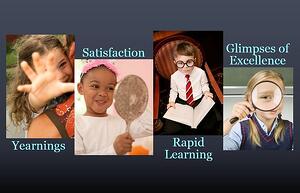 Several years ago I decided to take up tennis. I have always considered tennis to be the sport with the cutest outfits and I was excited to learn! The tennis courts in the neighborhood my husband and I had just moved into were beautiful and we thought tennis would be something fun we could do together.
Several years ago I decided to take up tennis. I have always considered tennis to be the sport with the cutest outfits and I was excited to learn! The tennis courts in the neighborhood my husband and I had just moved into were beautiful and we thought tennis would be something fun we could do together.
We approached the sport with a sense of enthusiasm and excellent intentions. We invested in some equipment; scheduled time to practice together and even signed up to play on a few beginner teams. I thought it would be perfect: We get to spend time together, we get exercise, we get to hang with friends… it was an excellent plan!
There was only one problem: My lack of tennis talent. And it proved to be a big problem.
Neither of us had ever played in a league, yet we noticed a huge difference immediately. Denis had a talent for tennis. I did not.
Everyone has talent—for something. Every single person in the world has a short list of things they are really good at. These are our talents and they define who we are, what we do, how we work, where we succeed, and why we’re valuable.
Just as all of us have a short list of talents, we also have a long list of non-talents. Whenever possible, we should avoid doing things that require talents we don’t have, and other people would be wise to avoid asking us to do them as well. When it came to tennis, I was asking myself to use a talent I didn’t have.
You Can’t Fix Weaknesses in Business or in Tennis
The key point here is that people do not succeed based on their weaknesses. That may seem obvious, but it’s important to reiterate: We will never progress or get ahead by leaning on our weaknesses—or by trying to fix our weaknesses.
 I grew up as the only girl with three brothers in the house—and a lot of laundry! That machine ran non-stop and I was always enlisted to help.
I grew up as the only girl with three brothers in the house—and a lot of laundry! That machine ran non-stop and I was always enlisted to help.

 “I’ve got you at a 10 and I need you at a 5.”
“I’ve got you at a 10 and I need you at a 5.” If you've been reading awhile, you know we discuss talent at The Center for Sales Strategy a lot. In fact, it's one of the foundations of our company. We believe that everyone has
If you've been reading awhile, you know we discuss talent at The Center for Sales Strategy a lot. In fact, it's one of the foundations of our company. We believe that everyone has  I told my son a lie last night. I didn’t mean to, but it just slipped out. As a certified talent analyst, I should definitely know better.
I told my son a lie last night. I didn’t mean to, but it just slipped out. As a certified talent analyst, I should definitely know better. Those who know me well know I adore hunting… for shoes, that is. I absolutely love pursuing the perfect pair of shoes. But I know that finding the right shoes doesn’t “just happen.” It is the result of continuous and constant effort, of skill and dedication. I invest time shopping. I scour fashion magazines and rip out pictures of pairs I like. I look at shoes online and sometimes save them in my “basket.” I prowl and stalk the shoe departments of my favorite stores like a quiet lion might pursue its prey. I admire them from a distance, I court them, I negotiate price, I wait for special deals and eventually, when the time is just right… I go for it and make them mine.
Those who know me well know I adore hunting… for shoes, that is. I absolutely love pursuing the perfect pair of shoes. But I know that finding the right shoes doesn’t “just happen.” It is the result of continuous and constant effort, of skill and dedication. I invest time shopping. I scour fashion magazines and rip out pictures of pairs I like. I look at shoes online and sometimes save them in my “basket.” I prowl and stalk the shoe departments of my favorite stores like a quiet lion might pursue its prey. I admire them from a distance, I court them, I negotiate price, I wait for special deals and eventually, when the time is just right… I go for it and make them mine. Visualize the person on your sales team with the most relationship talent. Can you picture her? Your social butterfly? She cares deeply about other people. She knows all her clients like personal friends and can easily recite the names of their kids. She brings clients their favorite coffee “just because” and gets the order right every time. She genuinely wants to know these things and prides herself on it. She is good at building instant connections with prospects as well as creating long term meaningful relationships with clients. She spends time at the water cooler and knows her teammates. Everyone loves her.
Visualize the person on your sales team with the most relationship talent. Can you picture her? Your social butterfly? She cares deeply about other people. She knows all her clients like personal friends and can easily recite the names of their kids. She brings clients their favorite coffee “just because” and gets the order right every time. She genuinely wants to know these things and prides herself on it. She is good at building instant connections with prospects as well as creating long term meaningful relationships with clients. She spends time at the water cooler and knows her teammates. Everyone loves her. Several years ago I decided to take up tennis. I have always considered tennis to be the sport with the cutest outfits and I was excited to learn! The tennis courts in the neighborhood my husband and I had just moved into were beautiful and we thought tennis would be something fun we could do together.
Several years ago I decided to take up tennis. I have always considered tennis to be the sport with the cutest outfits and I was excited to learn! The tennis courts in the neighborhood my husband and I had just moved into were beautiful and we thought tennis would be something fun we could do together. Have you ever gone to the grocery store hungry and without a shopping list?
Have you ever gone to the grocery store hungry and without a shopping list? We are dealing with a broken elbow in our house. My 9 year old son had a moment of misguided confidence and felt “certain” he could slam dunk a basketball. He is a 54,” 58-lb fourth grader and learned quickly that he cannot dunk.
We are dealing with a broken elbow in our house. My 9 year old son had a moment of misguided confidence and felt “certain” he could slam dunk a basketball. He is a 54,” 58-lb fourth grader and learned quickly that he cannot dunk. I recently attended my son’s fourth grade championship basketball game. They had a great season and fought hard, but they just couldn’t pull it out.
I recently attended my son’s fourth grade championship basketball game. They had a great season and fought hard, but they just couldn’t pull it out.
